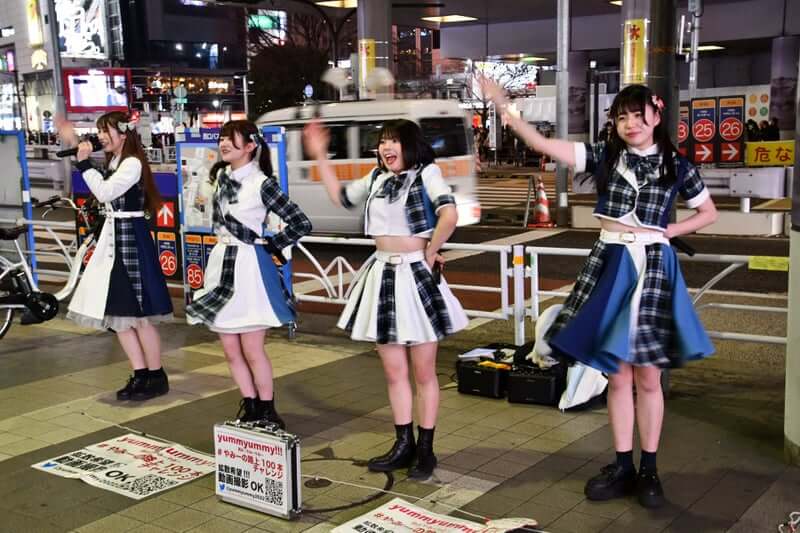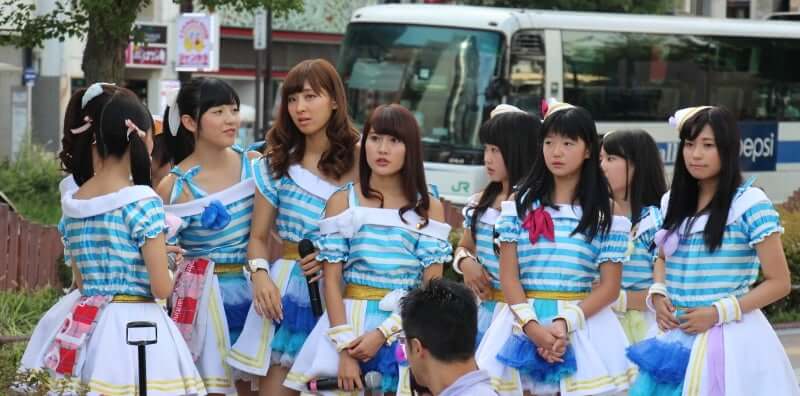Groups
Sakamichi Series: Nogizaka46 Sakurazaka46 Hinatazaka46
WACK Groups: BiSH
Japanese Idols News and Knowledge Base
Japanese Idols News and Knowledge Base

In Japan, idol groups have become a cultural phenomenon. These groups of young performers have amassed huge followings, selling out concerts, and appearing in commercials, TV shows, and movies. While the glitz and glamour of their stage shows are well known, many fans have also come to appreciate their humble beginnings as street performers.
Street performances have long been a part of Japanese culture. It’s not uncommon to see musicians, magicians, and other entertainers gathering crowds on street corners, in parks, and at train stations. For aspiring idol groups, street performances offer an opportunity to showcase their talents to a wider audience.
One of the most famous idol groups to have started as street performers is AKB48. Founded in 2005, the group initially performed in Akihabara, a district in Tokyo known for its electronics shops and otaku culture. The group’s founders saw street performances as a way to connect with fans and build a grassroots following. AKB48 quickly became popular, with fans flocking to their performances and following their social media accounts.
Today, AKB48 is one of the most successful idol groups in Japan, with over 100 members and numerous subgroups. While they no longer perform on the streets, their early experiences as street performers have left a lasting impact on their fanbase. Many fans see the group as approachable and down-to-earth, despite their superstar status.

Other idol groups have also used street performances to build their fanbase. Dempagumi.inc, a group known for their quirky and energetic performances, started out by performing in Akihabara and other parts of Tokyo. The group’s members have said that their early experiences on the street taught them the importance of connecting with fans and being able to improvise their performances.
In addition to connecting with fans, street performances have also helped idol groups build a connection with their local communities. For example, Keyakizaka46, a group based in Tokyo, has performed in local festivals and events. These performances have helped the group become an integral part of their community and allowed them to give back to their fans.
Despite the success of many idol groups, the industry has faced criticism for the way it treats its performers. Idol groups are often required to adhere to strict rules, including bans on dating and other personal activities. There have also been reports of mistreatment and abuse of performers by their management companies.
In response to these criticisms, some idol groups have tried to promote a more positive image. For example, the group Morning Musume has been known for promoting messages of self-confidence and self-love in their songs and performances. Other groups have focused on building a sense of community and camaraderie among their members.
In conclusion, street performances have played an important role in the development of many Japanese idol groups. These performances have helped groups connect with their fans and build a grassroots following. While the industry has faced criticism, many groups are trying to promote a more positive image and build a sense of community among their members and fans. For many fans, idol groups are more than just music and entertainment – they are a reflection of Japan’s vibrant street culture and a symbol of hope and inspiration.